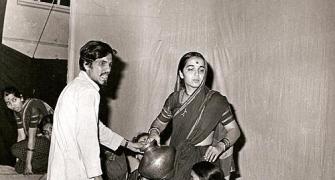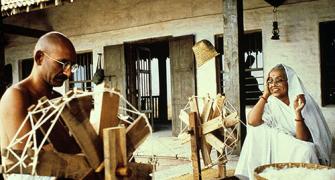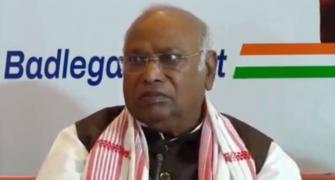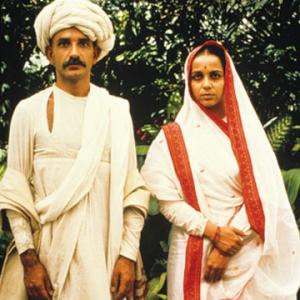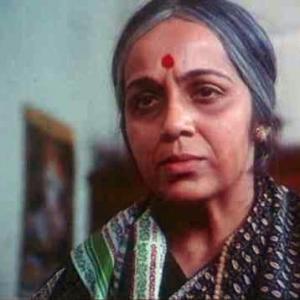'Bahut mazaa aaya tha doing Agneepath. When you are working with good actors, it enriches your acting.'
'Amitabhji and I had done Shahenshah before, but that was a fun film.'

Rohini Hattangady, who was seen in the Marathi film Aata Vel Zaali (It's Time To Go), feels films offer you life lessons.
She's had a long successful career in the movies, and she's learnt so much from it.
In the second segment of a fascinating life and times interview, Rohini goes back in time and tells Rediff.com Senior Contributor Roshmila Bhattacharya, "It was my first entry in my debut film and no way was I going to show just my profile to the audience! Poora chehra dekhni chahiye (my full face should be visible), I told myself, and improvised on the spot."
Let's flashback to your first film which released back in 1978: Saeed Mirza's Arvind Desai Ki Ajeeb Dastaan. What memories does it bring back?
Even though it was my first feature film, I had been actively doing theatre where they teach you that even if you aren't facing the audience in a scene, three-fourth of your profile should always be visible to them or they will get unsettled.
This was playing on my mind when my first shot was explained to me.
I had to open a door that leads to a passage. The camera is to the right, the door to Arvind's cabin to the left.
I have to head left and enter the room.
It was my first entry in my debut film and no way was I going to show just my profile to the audience!
Poora chehra dekhni chahiye (my full face should be visible), I told myself, and improvised on the spot.
I open the door, look to the right, straight into the camera, then, with a yahan nahin hai expression, head left towards the cabin.
(Laughs) If Saeed noticed what I did, he didn't comment or object and the audience got to see my full face.
Talking of plays, you won the prestigious Sangeet Natak Akademi Award in 2004 for your contribution to theatre.
Yes, that was nice.
Most people know me as a film actress, but I trained at the National School of Drama under Ebrahim Alkazi and started my career on stage.
In fact, while still at NSD, Jaydev (husband Jaydev Hattangadi) and I started our Marathi theatre group in Mumbai, Awiskar, and we produced over 150 plays.

You have acted in a Kannada play, and even a Japanese Kabuki play. I remember you in a solo, Marathi play, Aparajita.
That play was originally performed in Bengali by Tripti Mitra in the 1970s.
It was written by Nitish Sen for Shombhu Mitra.
Later, it was translated into Marathi by Tara Pandit and Sulabha Deshpande recommended it to Jaydev.
He found it very long and edited it considerably.
Also, after 30 years, he felt that the ending should change.
Why?
The play revolves around Aparajita, a battered woman who has been thrown out of her home by her promiscuous husband after she discovers that he is having an affair with his aunt.
She moves in with her brother and bhabhi and is entrusted to take care of their young son.
Wanting to do something in life, but not having any formal education, she reaches out to Sanjeevdada, her brother's once radical friend, who has several natak companies, for a role in a play.
She is waiting for the phone call which she hopes will change her life, but it comes with a price.
Aparajita is asked to come to the metro station, implying that she will have to compromise her dignity for the break which may or may not materialise.
So what change did you make?
In the original play, after much thought, Aparajita decides to go to the metro station.
Jayadev did not like the idea of her prostrating herself.
He thought as Aparjita, the unvanquished, she would do any work, no matter how menial, but would never compromise on her dignity.
So he changed the ending, with the writer's consent.
It now had Aparajita stating decisively, 'Main metro bhi nahin jaoongi.'
We performed the play in 1996, and coincidentally, the first performance was in Kolkata.
Nitishda, who was in the audience, came to meet us after the show and said that had he written the play now, this would have been his ending too.
I was relieved.
The character remained unsullied, undefeated and defiant.
Your character in Arth, the maid who works for Shabana Azmi's character Pooja, is also boldly defiant after killing her promiscuous, drunkard husband after he blows up the money she has saved for her daughter's education. It won you the Filmfare Award for Best Actress in a Supporting Role.
Yes, my inspiration for that character was Shantabai who washed the utensils in our house and helped my mother with the chores.
She lived in the vadi just behind our home in Pune.
Her husband worked in some factory and had to walk 10 miles to and from work.
They had a son and a daughter.
My brother and I would drop by her place during festivals like Ganesh Chaturthi.
Shantabai's daughter was two years younger than me and studied in the same school.
When I grew out of my school uniforms, she would get it, along with my books when I was promoted.
Shantabai was very insistent that her children should be educated well.
My mother helped her a lot.
Eventually, the daughter did a Montessori teaching course and started working.
(Smiles) When Arth was narrated to me, the character reminded me of Shantabai who had taught me how to wear a nine-yard sari in a play.

In the same year as Arth, there was Govind Nihalani's Party in which your performance won you the National Award for Best Supporting Actress.
Yes, but unlike the bai in Arth, Mohini is not in control of her life.
She has given up her career for a man, now a celebrated playwright, who is no longer interested in her and is having an affair.
Yet, she lies besides Divakar, night after night, yearning for his love.
There's that scene where while speaking to Deepa Sahi's Sona, Mohini looks into the mirror and shrinks back, afraid that she is now old and unattractive.
There's another scene before the mirror where she is applying, or rather smearing lipstick.
She is drunk throughout the party, actually, not sozzled, but tipsy.
(Laughs) Thoda sa peene se bahut kuchh bahar aa jaati hai (When you are slightly drunk, you reveal a lot).
Playing tipsy is also far more difficult to enact.

In 1990, there was Agneepath and Suhasini Chavan, the mother of Vijay Deenanath Chavan, a performance that won Amitabh Bachchan the National Award for Best Actor.
Bahut mazaa aaya tha (I had a lot of fun) doing that film. When you are working with good actors, it enriches your acting.
Amitabhji and I had done Shahenshah before, but that was a fun film.
Agneepath was very intense and one day, talking about his role, he said that in this film, he wanted the audience to sit forward in their seat.
That was his approach to the role.
While you have been applauded for your intense performances, you were delightful as Sridevi's wicked aunt, Amba, in ChaalBaaz, and also Sribaby in Jalwa.
(Smiles) Humour is difficult, you need to have the comic touch and your timing must be perfect.
I had played a few comic characters on the Marathi stage and jumped at the chance to play these characters even though in Jalwa, I had a cigarette in my hand.
I hate smoking, but had learnt how to smoke for the play Mitra Chi Gosht because my director, Vinay Apte, not only wanted me to puff on a cigarette but hold the smoke inside and then slowly exhale, so it came out of my mouth as I was speaking.
'You should look like you are smoking,' he would say, and on the first day of rehearsals. I was taught how to hold a cigarette, light one without my hand shaking, and finally, how to smoke it right.
By the time the rehearsals ended, I was an expert even though I still didn't like smoking.
Fortunately, in Jalwa, I just had to hold the cigarette in my hand. Not smoke it.

What's keeping you busy now?
There's Chandrakant Kulkarni's play, Charchughi.
The phrase 'char choughin sarkhi' in Marathi, from which the title is derived, means 'like four other or ordinary women' which these four most definitely aren't.
I play the aai (mother) and all three daughters were born from an affair with a married man.
One of the milestones of Marathi theatre, the play made history between 1990 and 2000.
It was revived 31 years after it was first staged, with a new cast.
We've already had 250 shows.
Then there is a small Marathi film, Respect, and a Telugu film, Telusa Manasa.
Do you speak Telugu too?
(Laughs) No, I don't know the language. I write my lines down phonetically and mug them.
I don't care for prompters so I've told the director to not give me more than four lines in a shot as that's all I can remember.



